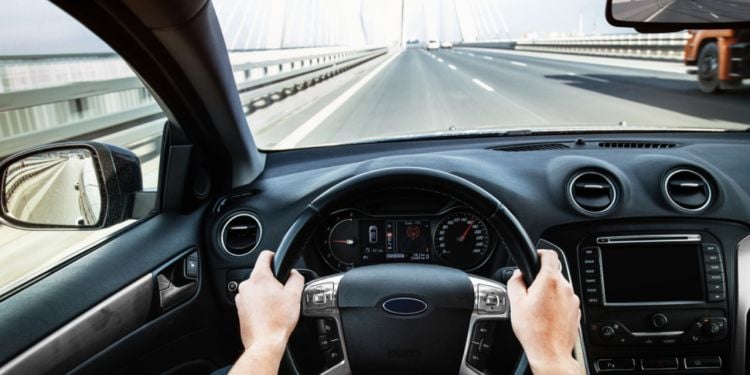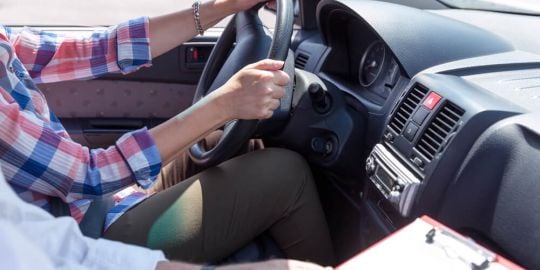Driving in Saudi Arabia

Driving in Saudi Arabia is the easiest and most convenient way to get around. That being said, foreigners in Saudi Arabia will have to get accustomed to the driving style in Saudi Arabia. Getting a good understanding of driving etiquette and road signage is the first step to developing your road skills in Saudi Arabia.
Can expats drive in Saudi Arabia?
To drive in Saudi Arabia, you need to be at least 18 years old. If you have a valid driver's license issued in one of the EU states, USA, Canada, Australia, New Zealand or the neighboring GCC states (Bahrain, Kuwait, Oman, and UAE), you will be able to use it for three months. If you have an international driver's license, you will be able to use it for a period of one year.
Important:
Since June 2018, women can legally drive on the territory of the Kingdom. The decades-long ban on women driving was finally lifted with a historical decree. It was a significant step for empowering women and for the mobility of both - expats and locals.
How to convert a foreign driver's license into a local one?
If your driver's license has been issued in the EU, USA, Canada, Australia, New Zealand or the neighboring GCC states, you won't need to take a driving test to get a new license. Instead, you will be able to convert your existing driver's license into a local one.
To convert your foreign driver's license in Saudi Arabia, you will need to:
- Get an Absher e-services account
- Pay a license fee
- Get your medical tests done (this typically includes eye and blood tests)
- Have your current license translated into Arabic by an approved translation agency
- Bring all of the above as well as your Iqama and passport to the nearest driving school
You will then be issued a local driver's license.
How to apply for a driver's license in Saudi Arabia?
If you don't yet have a driver's license or your driver's license can't be converted into a local one, you will need to apply for a new driver's license in Saudi Arabia. You can do that at one of the many driving schools across the country.
To apply for a driver's license, you will need to present the following documents:
- A receipt for the license fee
- Copy of your passport and four passport-sized photos
- Residence permit card (Iqama)
- Completed application form
- Medical report
Once you've submitted all the documents, you will first need to take a three-hour class followed by a test. Next, you will need to take a driving test.
If you pass both of these examinations successfully, you will be given a ten-year driver's license.
Driving in Saudi Arabia
Driving in Saudi Arabia may take some getting used to. While the road conditions and road safety in the country are improving, outside the big cities, you may still come across people not fully in line with traffic regulations.
You may also regularly come across armed guard posts on the road — which can be quite unnerving for those who are not used to this. If you are stopped at one of these road checks, do not panic and simply follow the instructions of the officer. In most cases, you will only be asked to show your driver's license, car papers and Iqama copy. Make sure to keep these documents with you at all times when driving in the country.
Like in most countries, in Saudi Arabia, you will be driving on the right side of the road. Road layouts are quite clear — but do get ready to come across plenty of roundabouts. Street signs in all major cities are bilingual (Arabic and English). With that, navigating local roads, even with a GPS, may be problematic: a lot of roads don't actually go by their official names, and local landmarks are often used instead when giving directions.
Traffic violations in Saudi Arabia can result in fines and license suspension. Each violation equals a certain number of points — when this number gets to 24, your license will be suspended. Note that driving under the influence will immediately amass you 24 points and result in an instant suspension of your driver's license as well as more serious legal consequences. To compare:
- Running a red light will cost you 12 points.
- Driving without breaks/lights equals 8 points.
- Not having your seatbelt on is 2 points.
Note the leading cause of traffic accidents in the country is speeding. This is why it is especially important to pay attention to the speed with which you are driving and observe all the regulations and speed limits in place. Urban freeways typically have a speed limit of 70km/h, and highways limit the driving speed to 120km/h. Keep in mind that all major routes are equipped with speed cameras.
Driving costs and car maintenance in Saudi Arabia
Driving in Saudi Arabia is definitely a more convenient option for getting around than taking public transportation. With that, make sure you are aware of the related costs.
One of the best things about driving in Saudi Arabia is the low fuel costs. The average price for a litre of petrol 95 is SAR 2.33 — which is about $0.62, half of the international average. There are also no road taxes or tolls to worry about.
However, as Saudi Arabia is characterized by an exceptionally hot climate, vehicle maintenance costs tend to be quite high and wear and tear sets in sooner. Note that you will need to submit your vehicle for the annual Motor Vehicle Periodic Inspection, called “fahas” in Arabic.
You are not obliged to purchase a fully comprehensive car insurance plan in Saudi Arabia — however, third-party coverage is compulsory.
Buying a car in Saudi Arabia
Brand-wise, Toyota is the leader of the Saudi Arabian car market with an extensive network of dealerships. Because of this, maintenance for Toyota vehicles is significantly easier and less expensive compared to other cars. With that said, American vehicles come in as a close second and are also quite popular with expats. Note that most cars run on petrol and Diesel options are quite rare. Electric cars, on the other hand, would be very hard to come across.
Overall, car prices in Saudi Arabia are on the reasonable side, and most expats prefer to buy or rent vehicles on the spot — as opposed to bringing their own cars from their home countries. Another reason for this is that car import rules in Saudi Arabia are quite strict, with lots of limitations and paperwork involved.
The majority of expats who move to Saudi Arabia do so on a work contract, which often includes transportation in the form of a personal vehicle with a driver. If this option is available to you, we strongly suggest that you take it — it will make things much easier on your part as driving in a foreign new city is never easy.
However, if transportation is not part of your contract, buying or renting a car would be the next best thing.
Buying a car in Saudi Arabia is quite straightforward. You simply need to locate a dealership that sells the model you are interested in, pay them a visit, take the vehicle for a test drive and, if everything is to your liking, proceed with the purchase. Most dealerships will take all the paperwork off of your hands, and you will simply need to sign on the dotted line.
If you are not on the market for a new vehicle, you can lease one. You will find both international and local car rental companies in the country that will be able to provide you with a car. To rent a car in Saudi Arabia, you need to be at least 25 years old and have a valid driver's license: whether local or foreign. You will also need to present your passport and Iqama.
Traffic accidents in Saudi Arabia
As we've mentioned at the beginning of this article, road safety is improving in the country. However, there is still quite a long way to go.
Speeding and reckless driving remain to be the leading causes of fatal traffic accidents. So, make sure that you stay vigilant and don't get distracted on the road when driving at any time.
If unfortunately, you do get into a traffic accident, you will need to call the emergency number — 933. (For a complete list of emergency numbers in Saudi Arabia, click here). During the call, you will need to provide the location and basic details on the accident — if you don't speak Arabic, it would be best to have someone help you make the call. You may also call your employer for assistance with this or reach out to your embassy. When the police arrive at the scene, they will write an accident report. Make sure not to sign any documents in Arabic if you don't understand their contents. If the police find you to be responsible for the accident, you will probably be asked to pay a fine. Depending on the seriousness of the accident, you might be held in custody until your fine is paid.
If your car breaks down in the middle of the road:
- Park out of the way of the traffic
- Turn in your hazard lights
- Place a warning triangle next to your vehicle
- Call a car breakdown service or 993.
- You can also ask for assistance from fellow motorists.
General tips for driving in Saudi Arabia
Driving in a foreign country can be seen as quite challenging at first. However, if you do your research, follow the traffic rules and exercise due diligence on the road, it can actually be both a convenient travel solution and an interesting experience.
To make sure your experience in the country's highways goes smoothly, check our list of precautions to take on the road.
When driving in Saudi Arabia, make sure to always have your driver's license, passport, Iqama and vehicle papers with you at all times.
Be very careful when driving at night, on poorly lit roads and in the countryside. Be aware that camels often cross roads, even in the cities — and hitting a camel is actually one of the frequent causes of traffic accidents in the country.
Avoid going off-road if you are not an experienced off-road driver or are not accompanied by one. Without knowing proper driving techniques, you can easily get stuck in the sand and will have to search for assistance.
Make sure to always have a good supply of drinking in your car. Temperatures in Saudi Arabia tend to get very high, and it's very important to have enough water with you in case of traffic or other emergencies.
If stopped by traffic police or at a checkpoint, remain calm and follow the officer's instructions. In most cases, you will only be asked to present your identification and car papers.
Pay extra caution when driving during the month of Ramadan. With everyone fasting all day, people tend to be in a hurry to get home at the end of the day, and there may be quite a bit of speeding on the roads.
Road rage is never a solution. If you don't feel like you are up for handling traffic or are having a hard time navigating the streets, consider hiring a car service to keep you out of trouble.







